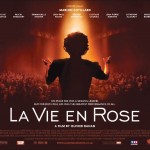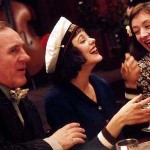Let’s face it, Piaf was one of those truly iconic stars, a tragic heroine who died young but lived a very full life, one in which everything, but everything happened – her sickly childhood, the marriages, the lovers, their deaths, the death of her only daughter. This was a woman whose life was so dramatic that nobody would dare write it as fiction. Just as stage shows preceded this movie, a movie was truly inevitable – and to be worthy of its subject it had to be a great movie. But is it great?
First problem: do I catalogue this movie under reviews of Classics or Newish Movies? Hmmmm… not an easy one, but I opted for Classics since many classics are flawed, and La Vie En Rose is certainly flawed – though it unmistakably contains some great ingredients too.
Among the features worthy of note are the cinematography and production design, creating exquisitely the locations in which ‘Piaf‘ (Edith Giovanna Gassion to give her her full name) lived her rich and varied time on this earth, appropriate to the era. The costumes, the make-up, everything is spot on. This is an incredibly beautiful movie to watch.
And most of the acting is sublime, quite apart from the representations of real people. Leading the plaudits, and quite rightly so, was Marion Cotillard as ‘la môme’ herself – she truly deserved her Best Actress Oscar, despite making a film that would normally have been consigned to the “foreign language” categories. Cotillard mimed Piaf’s songs, but her performance is truly breathtaking. This is so much more than an impersonation – she captures the spiky personality and fragile emotions from Piaf’s days singing on the street for coppers, right through to her dying days in Grasse, at 47 years but with the body of an 80-year old. This is a staggering performance, one in a million, one I would happily watch repeatedly and recommend to anyone, and she is supported beautifully by an excellent cast including Gerard Depardieu as Piaf’s early mentor.
The events are captured in the screenplay are mostly what happened in Piaf’s life, though purists have been sniffy about the historical accuracy of some – but then, when did you find a biopic that did not fudge some historical accuracy for efficacy of film-making? Perhaps the first flaw, though, is that director Olivier Dahan does not seem to know whether to play the movie for hyper-real or as a stylised representation to portray a metaphor of Piaf’s life. The result is that it tends on occasion to fall between two stools.
There are some parts that work stupendously well, notably the single shot where the camera pursues Piaf from fantasising about her lover Marcel Cerdan to making coffee and trying to find a present for him, and eventually to the moment when the people around her break the news that Cerdan is dead, his plane having crashed, and Piaf’s realisation and hysterical reaction. This is genius cinema – brilliant! Encore…
Alas, the patchy quality of the movie does not do justice to the great scenes. It would work better without an editing policy that jumps to and fro. On occasions you can see a connection which justifies this approach, but for the most part the leaps back and forward in time seem arbitrary and mystifying. Granted nobody makes a straightforward chronological biopic any more, but a more straightforward flashback would have been more logical and less episodic.
In its favour is that this biopic benefits greatly from not having been made in Hollywood. Schmaltz and syrupy sentimentalism is notable for its absence, for which we should all heave a great sigh of relief and give thanks.
I still watch this movie from time to time, tune out the dodgy bits and focus on the great things, the stuff that holds your attention no matter how many times you see it. Go see Cotillard, she is astonishing, and look out for that scene. You will have seen Piaf, more so than at her tomb in the Père Lachaise in Paris.






